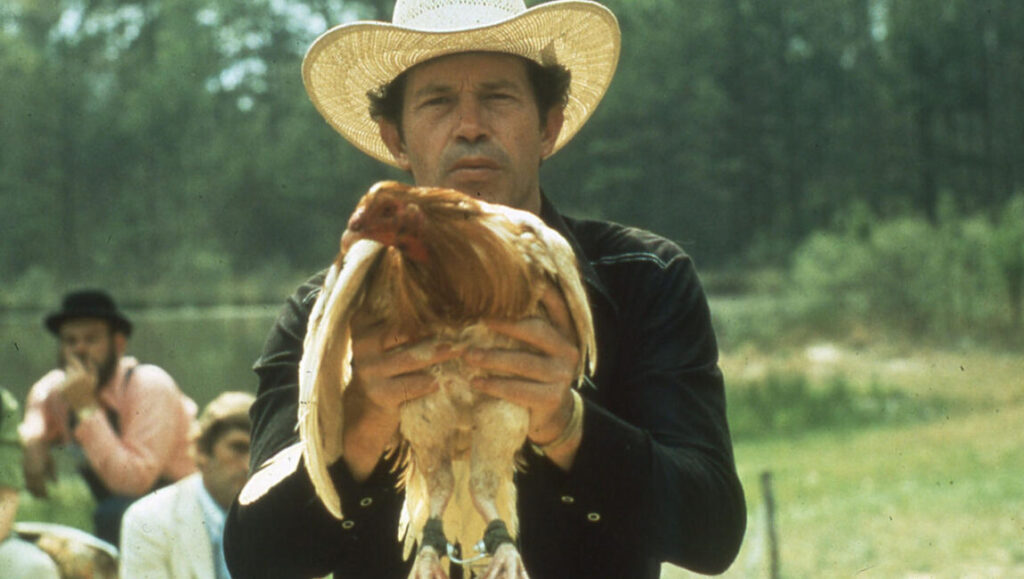Any talk of this film would be remiss without mention of its legendary tagline: “He came into town with his cock in his hand, and what he did with it was illegal in 49 states.” Notwithstanding this audacious piece of marketing, Cockfighter was a failure, and the only Roger Corman production of the ’70s that lost the producer money. Monte Hellman had been one of many hired by Corman’s Filmgroup company who was offered the chance to break into cinema; he and Coreman would go on to work together on a number of films, including the cult classics The Shooting and Ride in the Whirlwind. It was quite an odd pairing, considering the relative disparity between the two men’s styles of filmmaking. Corman would teach Hellman the art of the B movie; and yet, where the former was consistently successful at the box office, the latter flopped, sometimes even failing to secure distribution for his work. Hellman’s films have been described as “cryptic and esoteric,” and have only become studied through the cult following that now backs many of them. Cockfighter continues in this lane, mitigating the sensational elements of its producer in order to blend the barbarous sport of cockfighting with the introspective masculinity of Warren Oates. The film was re-released under various names and guises, in an attempt to draw audiences after its initial failure in the south, but apparently audiences just weren’t interested in watching men pit their cocks against one another.
What Hellman is outlining is masculinity’s tendency to cast others to the side in the search for self-defined success and fulfillment.
Cockfighter follows Frank Mansfield (Oates) as he struggles to make the money required to secure his position as a serious contender at the cockfighting championships. In typical Hellman style, this plot begins in media res: it’s only through flashback that we learn of Frank’s defeat prior to the last championship, as well as his subsequent decision to remain mute until securing victory. Oates’s opening voiceover relays Frank’s admiration for “anything that can fight to the death and not utter a sound,” i.e. the cockerel; this introduces an important aspect of the character that can be seen again through the other fighters — that is to say, all of the men here treat their cocks as a conduit for their masculinity, the success of the two being inextricably intertwined. Frank’s decision to remain silent confines him, on some level, to a singular obstinacy that restricts his actions to a series of gestures, until he proves his worth. But to whom? Herein lies the irony of the film. Frank’s journey is one of self-defeating and quixotic dedication, selling even his house to reinvest the money in a few birds (he didn’t live in it anyway). What Hellman is outlining is masculinity’s tendency to cast others to the side in the search for self-defined success and fulfillment. Frank’s fiancée, Mary, can be viewed in this way: forced to wait for the conclusion of her man’s Odyssean quest, she’s again shown that cockfighting, though nothing more than a game, takes precedence over her. Frank’s losses are due to his posturing, and his final win is only achieved with the help of his partner (who provides the cocks), so what good came of his blind determination? Indeed, many of Hellman’s protagonists could be described as such: they’re insular human beings whose paths are fatalistically pre-defined, products of their environment, doomed to continue down the road till their eventual demise.
Part of Kicking the Canon – The Film Canon.


Comments are closed.